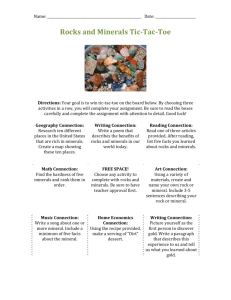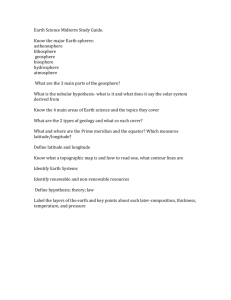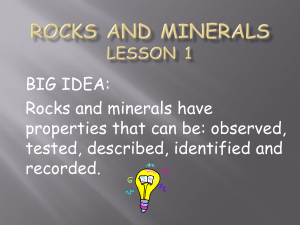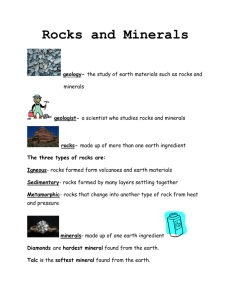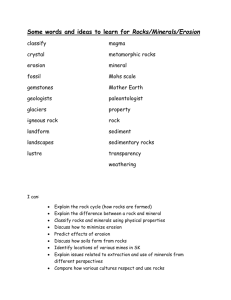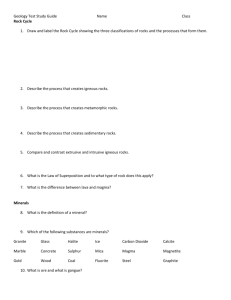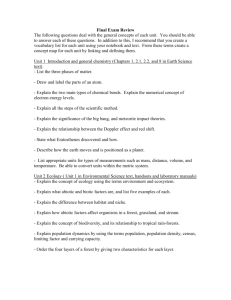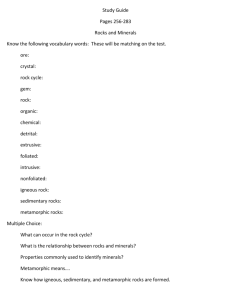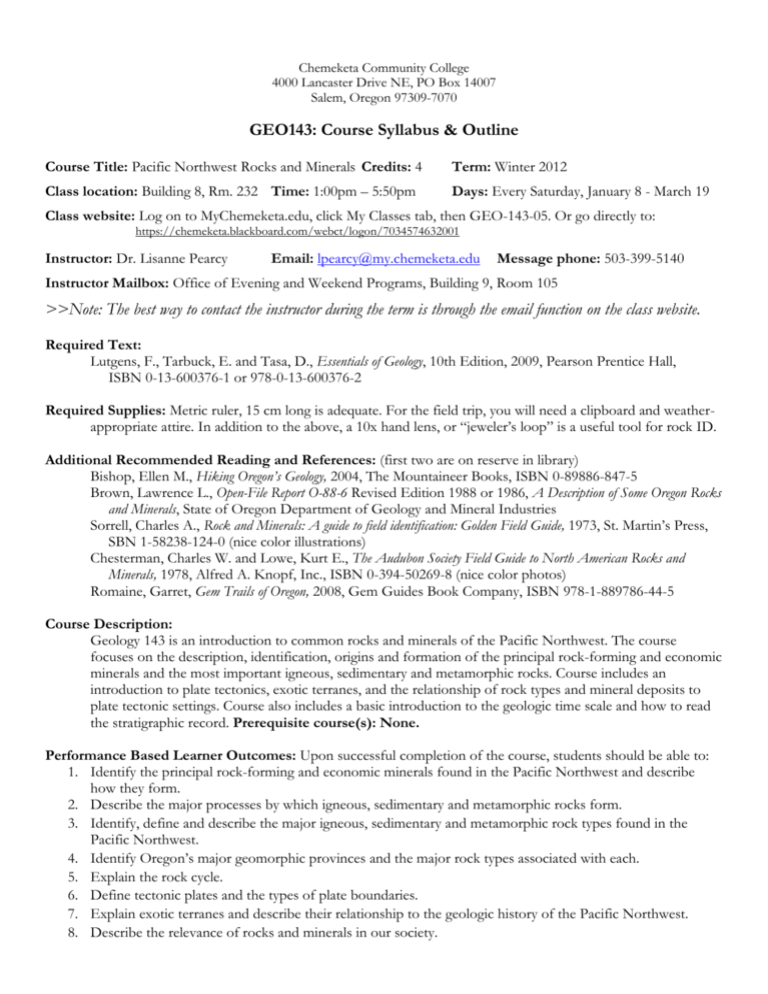
Chemeketa Community College
4000 Lancaster Drive NE, PO Box 14007
Salem, Oregon 97309-7070
GEO143: Course Syllabus & Outline
Course Title: Pacific Northwest Rocks and Minerals Credits: 4
Term: Winter 2012
Class location: Building 8, Rm. 232 Time: 1:00pm – 5:50pm
Days: Every Saturday, January 8 - March 19
Class website: Log on to MyChemeketa.edu, click My Classes tab, then GEO-143-05. Or go directly to:
https://chemeketa.blackboard.com/webct/logon/7034574632001
Instructor: Dr. Lisanne Pearcy
Email: lpearcy@my.chemeketa.edu
Message phone: 503-399-5140
Instructor Mailbox: Office of Evening and Weekend Programs, Building 9, Room 105
>>Note: The best way to contact the instructor during the term is through the email function on the class website.
Required Text:
Lutgens, F., Tarbuck, E. and Tasa, D., Essentials of Geology, 10th Edition, 2009, Pearson Prentice Hall,
ISBN 0-13-600376-1 or 978-0-13-600376-2
Required Supplies: Metric ruler, 15 cm long is adequate. For the field trip, you will need a clipboard and weatherappropriate attire. In addition to the above, a 10x hand lens, or “jeweler’s loop” is a useful tool for rock ID.
Additional Recommended Reading and References: (first two are on reserve in library)
Bishop, Ellen M., Hiking Oregon’s Geology, 2004, The Mountaineer Books, ISBN 0-89886-847-5
Brown, Lawrence L., Open-File Report O-88-6 Revised Edition 1988 or 1986, A Description of Some Oregon Rocks
and Minerals, State of Oregon Department of Geology and Mineral Industries
Sorrell, Charles A., Rock and Minerals: A guide to field identification: Golden Field Guide, 1973, St. Martin’s Press,
SBN 1-58238-124-0 (nice color illustrations)
Chesterman, Charles W. and Lowe, Kurt E., The Audubon Society Field Guide to North American Rocks and
Minerals, 1978, Alfred A. Knopf, Inc., ISBN 0-394-50269-8 (nice color photos)
Romaine, Garret, Gem Trails of Oregon, 2008, Gem Guides Book Company, ISBN 978-1-889786-44-5
Course Description:
Geology 143 is an introduction to common rocks and minerals of the Pacific Northwest. The course
focuses on the description, identification, origins and formation of the principal rock-forming and economic
minerals and the most important igneous, sedimentary and metamorphic rocks. Course includes an
introduction to plate tectonics, exotic terranes, and the relationship of rock types and mineral deposits to
plate tectonic settings. Course also includes a basic introduction to the geologic time scale and how to read
the stratigraphic record. Prerequisite course(s): None.
Performance Based Learner Outcomes: Upon successful completion of the course, students should be able to:
1. Identify the principal rock-forming and economic minerals found in the Pacific Northwest and describe
how they form.
2. Describe the major processes by which igneous, sedimentary and metamorphic rocks form.
3. Identify, define and describe the major igneous, sedimentary and metamorphic rock types found in the
Pacific Northwest.
4. Identify Oregon’s major geomorphic provinces and the major rock types associated with each.
5. Explain the rock cycle.
6. Define tectonic plates and the types of plate boundaries.
7. Explain exotic terranes and describe their relationship to the geologic history of the Pacific Northwest.
8. Describe the relevance of rocks and minerals in our society.
Course Syllabus & Outline
GEO143 – Winter 2012
Page 2
Week
1
Jan. 8
Course Calendar (Readings revised 1-22-11):
Pre-class
Pre-class
In-class
Weekly
Reading
TMYN module
Quiz
Topics
Ch.1: p.1-23
Pre-test
Introduction to Geology, Earth’s
Ch.2: p.34-43
Evolution & Structure, Rocks and
Weblinks: What is
Minerals; begin Physical Properties of
Geology?, Mineral
Minerals
Hardness video
2
Jan. 15
Ch.2:
p. 44-55
Weblink: Mineral
Density/Specific
Gravity
Physical Properties of Minerals,
continued
Mineral Properties:
Color, Streak, Luster,
Cleavage/Fracture
Ch.3: p.76-78
Ch.5:
p.112-123, 132133
Online:
Chalcedony
Optional:
L.L.Brown, p.
13-34
Ch. 1:
p. 17-19, 23-31
Ch. 3
Ch. 4
Fractions and
Percents
Mineral Groups; Economic Minerals
Economic Minerals
Intro Concepts,
Mineral Properties
Rock-Forming Minerals
Rock-Forming Minerals
Mineral Groups,
Economic Minerals
Plate Tectonics and the Rock Cycle,
Origin of Igneous Rocks
Bowen’s Reaction Series
Simulation
Rock-Forming
Minerals
Igneous Rocks: Classification,
Volcanoes and Plutons
Sediments and Sedimentary Rocks
Igneous Rocks
Cleavage video
3
Jan. 22
4
Jan. 29
5
Feb. 5
6
Feb. 12
7
Feb. 19
8
Feb. 26
9
Mar. 5
10
Mar. 12
11
Mar. 19
Graphing: Reading
and Plotting points
Ch. 6
Plate Tectonics,
Metamorphic Rocks
Rock Cycle, Igneous
Rocks
Field Trip – Urban Geology of Salem
Ch. 7
E.M.Bishop, p. 922
Post-test
Wrap up – Geologic History of Oregon
& Pacific Northwest
Final Exam
In-class
Lab
Mineral Properties:
Specific Gravity, Crystal
Form, Hardness
Sedimentary Rocks
Metamorphic Rocks
Field Trip Report
Individual Student
Presentations
Course Syllabus & Outline
GEO143 – Winter 2012
Page 3
Instructor Procedures and Institution Policies
Grading Criteria:
Quizzes
Labs & Assignments
Field trip report
Individual presentation
Final
40%
20%
10%
10%
20%
100%
A – 100 to 90
B – 89 to 80
C – 79 to 70
D – 69 to 60
F – 59 or below
Academic Honesty: Academic honesty is an indispensable value as students acquire knowledge and develop skills
in college. Students at Chemeketa Community College are expected to practice academic honesty by not cheating,
plagiarizing, colluding, or misrepresenting their coursework in any way. Students are ultimately responsible for
understanding and avoiding academic dishonesty whether such incidences are intentional or unintentional. Violations may
result in failure of an assignment or failure of the course. More information is available at:
http://www.chemeketa.edu/catalog/academichonesty/index.html
Course Syllabus & Outline
GEO143 – Winter 2011
Page 4
Students are encouraged to collaborate on lab work in class, but should work independently on take-home
assignments unless instructed otherwise. All tests will be closed book and closed notes.
Attendance: This is a hands-on, participatory class. Lab materials are available for exercises and quizzes only in the
classroom during scheduled class times. Lectures contain essential material not available in the texts. For these
reasons it is essential for students to attend class regularly. Please arrange any absences in advance, if possible.
The possibility of making up lab work or quizzes is at the discretion of the instructor. In case of contagious illness,
please do NOT come to class. However, it is your responsibility to get notes, assignments, and announcements
from a classmate if you miss class.
Assignments: Lab assignments are designed to be done in class and are due at the end of class on the day they are
assigned. The field trip report is due immediately at the end of the field trip. Any take-home assignments are due at
the beginning of class on their due dates. Work turned in late will be deducted 10% (one letter grade) and will not
be accepted more than one week late without special permission of the instructor. Work for extra credit is not
normally accepted; see the instructor if unusual circumstances affect you.
Exams: This class includes 4 quizzes and one final exam, each of which have a hands-on component, so all exams
must be taken in class. Each student will be allowed to make up any one quiz missed during the term. Make-up
quizzes will be offered only once, the week following the initial quiz. In addition, your worst quiz score, or one lab or quiz
that you missed and did not make up, will not be included in your final grade. The final exam must be taken at the scheduled
time except in special cases with prior notification and arrangement (at least 1 week before the exam) and
authorization by the instructor.
Course Webpage: Class announcements, lecture outlines, study guides and updates/revisions to this syllabus will
be posted online at our class website. Please become familiar with the site and check it between classes. To get
there, log in to your MyChemeketa account, go to My Courses, and click on the first section of Pacific NW Rocks &
Minerals (section GEO-143-05).
Expectations of Students:
Attend each class for the full time.
Be prepared with readings and written work completed on time.
Respect one another's needs for a productive learning environment: Arrive on time. Silence cell phones &
pagers. If you need to take or make a call, step outside the room. Use notebook computers for note-taking
only. Web surfing is distracting to those around you, even if they can’t see your screen.
Take risks in sharing your ideas.
Be comfortable with ambiguity, uncertainty, and complexity as you study.
Take responsibility for your learning!
Advising and Counseling: Recent research indicates that community college students who seek out academic
advising are more likely to meet their educational goals. Meeting with an advisor can help:
clarify your academic and life goals,
choose classes that prepare you for a career, and
ensure whether your credits will transfer to another institution.
Advising is available by making an appointment at Counseling and Career Services in Building 2 (503-399-5120 or
advising@chemeketa.edu). In addition, you may want to explore My Game Plan, an electronic educational planning
system at http://my.chemeketa.edu. Instructors are also available to discuss class, degree, and career options. Start
planning now.
Course Syllabus & Outline
GEO143 – Winter 2011
Page 5
Accommodations: Students who need accommodations for a disability should contact this instructor or Disability
Services in Building 2, Room 174 or call 503-399-5192 (V/TTY) or email disability@chemeketa.edu.
Diversity Values: We are a college community enriched by the diversity of our students and staff. Each individual
and group has the potential to contribute in our learning environment. Each has dignity. To diminish the dignity of
one is to diminish the dignity of us all.
Affirmative Action: It is the policy of Chemeketa Community College and its Board that there will be no
discrimination or harassment on the basis of race, religion, color, sex, age, national origin, ethnic origin, sexual
orientation, gender identity, marital status, citizenship status, pregnancy and related conditions, family relationship,
veteran’s status, disabilities and tobacco usage in any educational programs, activities or employment. Persons
having questions about equal opportunity/affirmative action should contact the Affirmative Action Officer at 4000
Lancaster Dr. NE, Salem, Oregon 97309-7070, or call 503.399.4784. To request this publication in an alternative
format, please call 503.399.5192.
Chemeketa Services and Resources for Student Success
Library Services: Bldg. 9, Rm. 200, 503-399-5043
Open computer labs: Bldg. 6, Rm. 218 and in Bldg. 9/Library
Study Skills Center: Bldg. 2, Rm. 212, 503-399-5162
Tutoring Services: Bldg. 2, Rm. 210, 503-399-5190
Science Study Lab: Bldg. 8, Rm. 230. Register for CRN 55203; it is free to register and there is no credit,
but you MUST be registered in order to use the lab. This is highly recommended for your success in this
class. See Science Study Lab Rules posted on class website.
Lab hours are:
Monday 12:30-6:00
Tuesday 10:00-1:00
Wednesday 12:00-6:00
Thursday 10:00-1:00
Fri., Sat., Sun. 12:00-5:00

